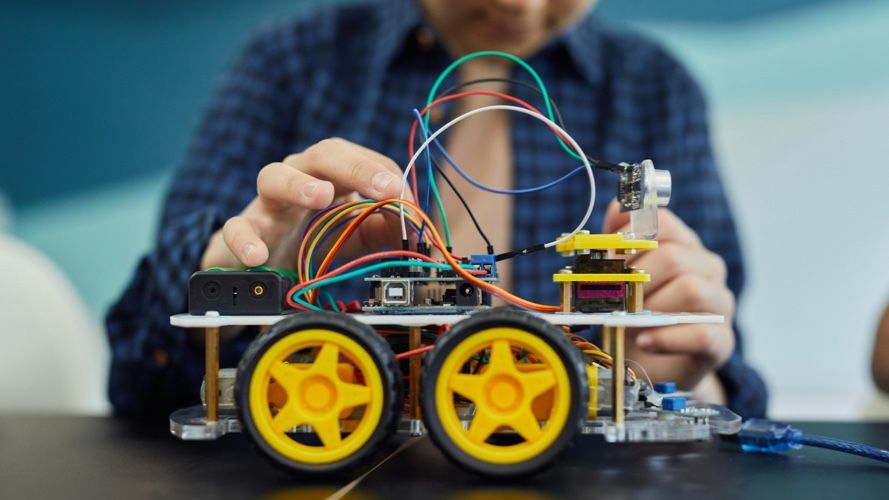Tech & coding camps: day vs overnight guide for parents

Introduction
Tech and coding camps are rapidly becoming a favorite for curious, digitally-minded kids. These programs spark interest in subjects like robotics, programming, and game development while building real-world skills. But as a parent, especially if this is your first experience with camp, it’s normal to wonder whether a day camp or an overnight format is best for your child. This guide will walk you through both, so you can feel confident in your choice.
Key takeaways:
- Tech and coding camps teach hands-on STEM skills through fun, project-based learning.
- Day camps are great for younger kids or first-timers who prefer coming home each day.
- Overnight camps offer a deeper dive into skills and social experiences with full-day immersion.
- Your choice depends on your child’s age, independence, and family schedule.
Table of Contents
What is a tech or coding camp?
Tech and coding camps introduce children to computer science in a fun, age-appropriate way. These camps often focus on hands-on projects like building a game, designing a robot, or coding an animation. They cater to different age groups and experience levels and are ideal for kids with a natural curiosity about how technology works.
For day campers
Day tech camps usually run locally, offering full or half-day schedules. Kids return home at the end of each day, making this a gentle introduction to the camp experience. Programs often blend hands-on coding sessions with structured breaks, games, and outdoor time. Supervision is high, and instructors are typically STEM educators or tech professionals.
For overnight campers
Overnight tech camps offer a more immersive experience, with extended time for complex projects, team collaboration, and even late-night coding labs. These camps often take place on college campuses or dedicated campgrounds and offer a mix of learning and traditional camp fun, like campfires or evening games.
Typical camp activities
Campers dive into a variety of tech-focused experiences like game development, robotics, web design, 3D printing, and even ethical hacking. Many camps use popular tools like Scratch, Python, and Arduino to teach real-world skills in an engaging, age-appropriate way.
For day campers
Day campers get a taste of several activities in short, energetic sessions. There's often a mix of screen time and hands-on builds to keep kids engaged. Activities might rotate daily to allow exposure to different tech disciplines.
For overnight campers
With more time, overnight campers can participate in longer-term projects - like building a game from scratch or programming a robot to complete challenges. There are also night activities like coding tournaments or outdoor games that help balance screen time.
Sample daily schedule
Day camp schedule
| Time | Activity |
|---|---|
| 9:00 AM | Drop-off and morning warm-up |
| 9:30 AM | Intro to coding project |
| 12:00 PM | Lunch and outdoor break |
| 1:00 PM | Afternoon project or game challenge |
| 3:30 PM | Wrap-up and pick-up |
Overnight camp schedule
| Time | Activity |
|---|---|
| 7:30 AM | Wake up and breakfast |
| 9:00 AM | Morning coding lab |
| 12:00 PM | Lunch and free time |
| 2:00 PM | Afternoon group challenge |
| 5:00 PM | Dinner |
| 7:00 PM | Evening activity or movie night |
| 9:30 PM | Lights out |
Meals and Accommodations
Day Camps
Most tech day camps provide snacks and ask campers to bring their own lunch. Some offer catered or in-house options, and allergy accommodations are typically available.
Overnight Camps
Overnight campers usually stay in dorms or shared cabins with trained staff supervision. Meals are served cafeteria-style and cater to dietary restrictions such as vegetarian, gluten-free, or nut-free options.
Cost & Value Considerations
Day Camps
- More affordable than overnight options
- No packing or sleepaway preparation needed
- Good fit for local families and younger kids
Overnight Camps
- Includes meals, lodging, and extended learning hours
- More immersive experience with deeper bonding
- Ideal for older or returning campers
What to Expect as a Parent
Sending your child to a tech or coding camp can feel like a big leap-especially if it’s their first time away from home or exploring a specialized interest. Parents can expect detailed orientation materials, daily updates (especially for day camps), and dedicated staff to answer any questions throughout the session.
For day camps, you’ll be managing drop-off and pick-up logistics, but your child will come home each evening with new stories and skills. Overnight camps include more communication upfront about packing lists, camper safety, and how homesickness is handled-especially if it's their first overnight experience.
Most camps also provide progress reports, camp photos, or platforms where you can see what your child is working on during the session.
Benefits of Tech & Coding Camps
Tech and coding camps offer far more than just screen time-they build creativity, logical thinking, collaboration, and digital fluency that prepares kids for the future.
- Skill Development:Kids learn real-world coding, game development, robotics, animation, and more-often in project-based formats.
- Confidence Building:Completing projects, troubleshooting, and presenting to peers encourages confidence and public speaking skills.
- Teamwork & Collaboration:Many camps promote teamwork through group coding challenges or design sprints.
- Early Career Exposure:Kids can explore future career paths in STEM in a low-pressure, fun environment.
Plus, they provide a great balance of screen-based learning and social interaction-especially when camps include outdoor breaks or team games.
How to Choose Between Day and Overnight Tech Camps
The right format depends on your child’s age, experience, personality, and your family’s goals. Here’s how to weigh the options:
For Day Campers
- Best for younger kids or first-timers.
- Allows them to return home each evening while still diving into structured tech learning.
- Gives parents daily check-ins and easier logistics.
For Overnight Campers
- Ideal for older or more independent children.
- Immersive environment encourages stronger social bonds and deeper learning experiences.
- Great opportunity for building independence and life skills alongside tech skills.
If you're unsure, many camps offer shorter overnight sessions or hybrid options to help ease the transition.
Questions to Ask the Camp
- What tech tools and platforms will my child use?
- Are instructors trained in education, coding, or child development?
- How is the balance between screen time and physical activity handled?
- What safety and supervision policies are in place?
- Is there support for homesick or first-time campers?
FAQ
- What age is best for tech camps?
- Introductory day camps often start at age 6, while overnight camps typically serve ages 10 to 17. Look for age-specific tracks to match your child's stage.
- Do kids need experience beforehand?
- Not at all. Most camps welcome beginners and group campers by skill level, so your child will learn at a comfortable pace.
- Will my child be on screens all day?
- While screen use is central, camps schedule outdoor play, hands-on building, and social time to provide healthy balance.
Conclusion
Tech camps are a powerful way to fuel curiosity and build STEM confidence. Whether your child is a first-time coder or future engineer, there’s a program to match their interests and maturity level.



